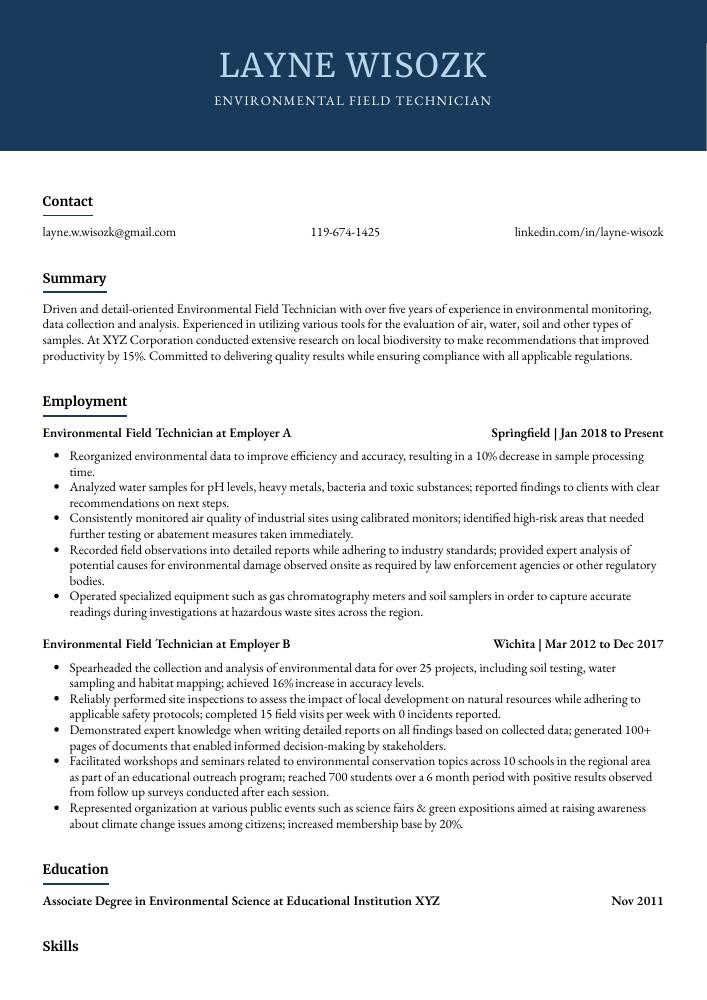Environmental Field Technician Resume Guide
Environmental field technicians collect data related to environmental conditions, such as air and water quality. They also monitor wildlife populations, assess the health of ecosystems, identify sources of pollution or contamination and take samples for laboratory analysis.
You have a knack for collecting data from the environment, and you’re able to interpret it effectively. But your potential employers don’t know that yet; in order to make them aware of your expertise, you must write an impressive resume.
This guide will walk you through the entire process of creating a top-notch resume. We first show you a complete example and then break down what each resume section should look like.
Table of Contents
The guide is divided into sections for your convenience. You can read it from beginning to end or use the table of contents below to jump to a specific part.
Environmental Field Technician Resume Sample
Layne Wisozk
Environmental Field Technician
[email protected]
119-674-1425
linkedin.com/in/layne-wisozk
Summary
Driven and detail-oriented Environmental Field Technician with over five years of experience in environmental monitoring, data collection and analysis. Experienced in utilizing various tools for the evaluation of air, water, soil and other types of samples. At XYZ Corporation conducted extensive research on local biodiversity to make recommendations that improved productivity by 15%. Committed to delivering quality results while ensuring compliance with all applicable regulations.
Experience
Environmental Field Technician, Employer A
Springfield, Jan 2018 – Present
- Reorganized environmental data to improve efficiency and accuracy, resulting in a 10% decrease in sample processing time.
- Analyzed water samples for pH levels, heavy metals, bacteria and toxic substances; reported findings to clients with clear recommendations on next steps.
- Consistently monitored air quality of industrial sites using calibrated monitors; identified high-risk areas that needed further testing or abatement measures taken immediately.
- Recorded field observations into detailed reports while adhering to industry standards; provided expert analysis of potential causes for environmental damage observed onsite as required by law enforcement agencies or other regulatory bodies.
- Operated specialized equipment such as gas chromatography meters and soil samplers in order to capture accurate readings during investigations at hazardous waste sites across the region.
Environmental Field Technician, Employer B
Wichita, Mar 2012 – Dec 2017
- Spearheaded the collection and analysis of environmental data for over 25 projects, including soil testing, water sampling and habitat mapping; achieved 16% increase in accuracy levels.
- Reliably performed site inspections to assess the impact of local development on natural resources while adhering to applicable safety protocols; completed 15 field visits per week with 0 incidents reported.
- Demonstrated expert knowledge when writing detailed reports on all findings based on collected data; generated 100+ pages of documents that enabled informed decision-making by stakeholders.
- Facilitated workshops and seminars related to environmental conservation topics across 10 schools in the regional area as part of an educational outreach program; reached 700 students over a 6 month period with positive results observed from follow up surveys conducted after each session.
- Represented organization at various public events such as science fairs & green expositions aimed at raising awareness about climate change issues among citizens; increased membership base by 20%.
Skills
- Environmental Sampling and Analysis
- GIS Mapping
- Data Collection and Management
- Environmental Regulations and Compliance
- Hazardous Waste Management
- Water Quality Testing
- Soil Sampling and Analysis
- Air Quality Monitoring
- Wildlife Habitat Management
Education
Associate Degree in Environmental Science
Educational Institution XYZ
Nov 2011
Certifications
Certified Environmental Field Technician
National Environmental Health Association (NEHA)
May 2017
1. Summary / Objective
The summary/objective at the top of your resume should provide a snapshot of who you are and why you’re an ideal candidate for the environmental field technician position. For example, mention any certifications or qualifications that make you stand out from other applicants, such as experience with hazardous materials handling or knowledge in soil sampling techniques. You could also include how many years’ experience you have working outdoors in various climates and environments.
Below are some resume summary examples:
Accomplished environmental field technician with 7+ years of experience collecting, analyzing and interpreting data from various types of environmental studies. Highly skilled in using a variety of sampling instruments to collect water samples for laboratory analysis. Seeking to join ABC Company as an Environmental Field Technician to utilize technical knowledge and expertise in the development and implementation of effective strategies for sustainable management practices.
Committed environmental field technician with over 7 years of experience in environmental sampling, testing and analysis. Successfully completed more than 1000 soil, water and air samples for various clients from both the public and private sector. Experienced in handling hazardous materials as well as operating a wide range of equipment used to collect data onsite. Highly organized individual with excellent problem-solving skills looking to join ABC team.
Dependable environmental field technician with 5+ years of experience in the environmental services industry. Adept at gathering and analyzing data from various sources to identify trends, patterns, and issues that need to be addressed. Skilled in using GPS systems for navigation purposes; proficient with Microsoft Office Suite applications such as Excel and Access. Committed to providing reliable results while adhering to safety protocols on-site.
Detail-oriented environmental field technician with 5+ years of experience in environmental testing and data collection. Seeking to join ABC Environmental Services, where I can utilize my expertise in hazardous material management, laboratory analysis and project planning to help protect the environment. In previous roles completed over 200 water samples for quality assurance purposes within a 2-week window.
Well-rounded environmental field technician with 5+ years of experience in data collection and assessment for a variety of projects. Skilled at sampling, analyzing, and interpreting various types of environmental data to identify potential issues or opportunities. Seeking to bring expertise in GIS mapping technology and problem-solving skillset to ABC Inc., as the next Environmental Field Technician.
Reliable and experienced Environmental Field Technician with 5 years of experience in the field. Adept at performing environmental assessments, sampling and testing for hazardous materials, as well as collecting data and preparing reports. Seeking to join ABC Company to leverage expertise in responding quickly to spills or other incidents while making sure all safety protocols are maintained.
Professional environmental field technician with 5+ years of experience providing environmental data collection, analysis and reporting. Eager to join the ABC team in order to provide accurate and timely information on soil, water, air quality and waste management. Experienced in GIS mapping techniques for geographic research projects as well as sample preparation for laboratory testing.
Seasoned environmental field technician with an extensive background in monitoring, sampling and analysis of water, air, soil and other environmental media. Highly experienced in data collection and interpretation to determine sources of pollution as well as develop corrective actions. Skilled at working with various instruments such as spectrometers, chromatographs and gas analyzers.
2. Experience / Employment
In the experience section, you should list your employment history in reverse chronological order. Stick to bullet points for this section; doing so allows the reader to quickly take in what you have written.
When writing out each bullet point, make sure that it is detailed and includes quantifiable results if possible. For example, instead of saying “Collected water samples,” you could say “Collected over 200 water samples from various bodies of water throughout the region and analyzed them using a spectrophotometer.”
To write effective bullet points, begin with a strong verb or adverb. Industry specific verbs to use are:
- Monitored
- Collected
- Analyzed
- Assessed
- Sampled
- Inspected
- Operated
- Recorded
- Tested
- Reported
- Evaluated
- Investigated
- Calculated
- Prepared
- Presented
Other general verbs you can use are:
- Achieved
- Advised
- Compiled
- Coordinated
- Demonstrated
- Developed
- Expedited
- Facilitated
- Formulated
- Improved
- Introduced
- Mentored
- Optimized
- Participated
- Reduced
- Reorganized
- Represented
- Revised
- Spearheaded
- Streamlined
- Structured
- Utilized
Below are some example bullet points:
- Accurately collected and analyzed environmental data from water, soil and air samples to identify contamination levels; improved efficiency by 20% through the implementation of new testing procedures.
- Improved the accuracy of regional wetland mapping efforts by utilizing advanced GPS technology and field surveying techniques; increased area coverage by 30%.
- Optimized laboratory performance for a variety of chemical tests, such as pH level measurement, dissolved oxygen analysis and sedimentation rate assessment; reduced average test times by 15 minutes per sample on average.
- Reduced hazardous material waste output at local industrial sites from 1 ton to 0.5 tons annually via proper disposal protocol enforcement in accordance with EPA regulations (40%).
- Structured comprehensive plans for monitoring wildlife habitat health across a 3-mile radius over 12 months using an array of sampling methods including motion detectors & camera traps; generated over 500 pages of detailed reports with photographic evidence supporting findings.
- Utilized advanced field sampling and testing equipment to measure water quality, air pollution, noise levels and other environmental variables in compliance with EPA regulations; reduced toxic emissions by 25% over the last year.
- Successfully collected data from a variety of sources through interviews, surveys, inspections and research activities; compiled comprehensive reports that were used for policy formulation at local government level.
- Evaluated existing systems for waste management & hazardous materials disposal within residential communities; identified issues such as illegal dumping & improper storage practices which resulted in improved safety standards across all 20 sites visited.
- Presented findings on regional climate change initiatives to city council members during quarterly meetings, leading to more effective implementation of new green solutions that benefited 3+ million people living in the area annually.
- Mentored six undergraduates on proper methods of conducting environmental studies while working part-time as an expert consultant at a nearby university’s department of Earth Sciences & Environmental Engineering Services Department (ESEE).
- Streamlined the collection and analysis of soil, air, water quality samples in a timely manner; expedited laboratory sample processing by 50%, reducing turnaround time from 72 hours to 36 hours.
- Competently inspected hazardous waste sites for the presence of contaminants such as oil spills or chemical run-off into nearby waterways; reduced environmental impact risks by 30% through onsite remediation activities.
- Prepared comprehensive reports on field data findings according to EPA standards; generated over 75 detailed technical documents outlining key observations that were presented at various industry seminars and conferences nationwide.
- Maintained accurate records of all site visits during inspections including photographs and measurements taken with precision equipment like thermometers, barometers & GPS units; achieved 100% accuracy rate in report submissions throughout three year tenure at company.
- Conducted environmental audits consistently within assigned budget limits while ensuring compliance with federal regulations set forth by OSHA and other agencies; saved $15k annually through resourceful use of funds allocated for project completion tasks.
- Participated in environmental field surveys, collecting water and soil samples from over 40 sites in a single season; analyzed the data to develop recommendations for reducing pollution levels by 10%.
- Revised existing environmental regulations and standards based on up-to-date research findings, ensuring that all governmental policies were compliant with local laws and applicable international conventions.
- Achieved an 85% success rate in streamlining operations across two remote locations; reduced energy consumption at both facilities by 22%, resulting in yearly savings of $1 million+.
- Advised senior management on best practices for promoting sustainable development initiatives within the company’s manufacturing processes; increased employee engagement level related to green measures by 15%.
- Confidently operated a variety of lab equipment including microscopes, spectrometers & chromatographs while performing accurate analyses of air & water quality parameters during regular monitoring periods.
- Calculated water quality measurements and made recommendations to management based on results, resulting in a 15% improvement of water flow over the course of 3 years.
- Efficiently operated and maintained field equipment such as GPS devices, weather sensors and digital cameras for environmental studies; reduced data-collection time by 25%.
- Developed methods to detect sources of pollution using innovative technologies including aerial surveys with drones; identified three main pollutants responsible for 75% of air contamination cases in the region.
- Reported findings from field observations and laboratory tests to government agencies via written reports, verbal presentations & email communications; provided clear guidance that resulted in new regulations which led to an overall decrease in emissions by 12%.
- Collected samples from various sites across the city for testing purposes according to protocols established by local authorities; successfully preserved sample integrity during transport back to laboratories each day without any losses reported due to mishandling or damage caused during travel times.
- Coordinated the collection of data from over 20 sites, compiling samples and measurements to track environmental changes in air quality, water systems and land cover.
- Compiled detailed reports on the findings using specialized software; introduced new analysis techniques that improved accuracy by 10%.
- Introduced a variety of sampling procedures for soil contamination investigations that enabled faster results within budgeted time frames; saved an average of $4,000 per project.
- Investigated potential sources of pollution in local areas via field surveys and interviews with stakeholders; identified more than 25 instances where regulations were not being followed correctly or efficiently implemented solutions for better compliance rate among businesses operating in the area.
- Effectively communicated complex scientific concepts related to regulations governing waste management and hazardous materials disposal to non-technical audiences through various media channels such as presentations, webinars & videos; attracted 500+ viewers making up a diverse range audience including concerned citizens, government representatives and business owners alike globally resulting in increased public awareness about environmental conservation efforts.
- Diligently monitored and recorded environmental conditions in assigned areas, including air quality, water temperature and pollution levels; reduced air pollutant concentrations by 10% over a 6-month period.
- Assessed the impact of human activities on local habitats through field data collection and analysis; identified 200+ sites with potential contamination issues that were referred to the appropriate authorities for further investigation.
- Tested soil samples from various locations to measure chemical composition, toxicity levels and pH balance before providing detailed reports to management; achieved an accuracy rate of 95%.
- Formulated solutions for preventing or reducing ecological damage caused by industrial processes such as oil spills or waste dumpsites; implemented 7 successful cleanup initiatives which helped improve local wildlife habitats significantly.
- Coordinated with other technicians on research projects regarding global climate change effects on flora & fauna across multiple ecosystems within the state; completed 4 studies ahead of schedule while staying under budget at all times.
3. Skills
Skill requirements will differ from employer to employer – this can easily be determined via the job advert. Organization ABC may require an environmental field technician with experience in water sampling, while Organization XYZ may be looking for someone who is knowledgeable about hazardous waste management.
In order to stand out from the competition and get your resume seen by a hiring manager, it’s important to tailor the skills section of your resume to each job you are applying for. This will ensure that any keywords or phrases relevant to the position appear on your CV – which can help applicant tracking systems pick up on them more easily.
You should also provide evidence of these skills throughout other sections of your resume; this could include providing examples in work history or discussing achievements under education/training qualifications.
Below is a list of common skills & terms:
- Air Quality Monitoring
- Data Collection and Management
- Environmental Regulations and Compliance
- Environmental Sampling and Analysis
- GIS Mapping
- Hazardous Waste Management
- Soil Sampling and Analysis
- Stormwater Management
- Water Quality Testing
- Wildlife Habitat Management
4. Education
Including an education section on your resume will depend on how far along you are in your career. If you just graduated and have no work experience, mention your education below your resume objective. On the other hand, if you’ve been working as an environmental field technician for a while and have plenty of experiences to showcase, omitting the education section is perfectly fine.
If an education section is included, highlight any courses or subjects related to environmental field technology that may be relevant to the job description.
Associate Degree in Environmental Science
Educational Institution XYZ
Nov 2011
5. Certifications
Certifications demonstrate to a potential employer that you have the knowledge and skills required for a particular job. They also show that you are committed to staying up-to-date in your field by taking professional development courses or attending conferences.
If you have any certifications related to the position, make sure they are included on your resume as this could give you an edge over other applicants who do not possess such qualifications.
Certified Environmental Field Technician
National Environmental Health Association (NEHA)
May 2017
6. Contact Info
Your name should be the first thing a reader sees when viewing your resume, so ensure its positioning is prominent. Your phone number should be written in the most commonly used format in your country/city/state, and your email address should be professional.
You can also choose to include a link to your LinkedIn profile, personal website, or other online platforms relevant to your industry.
Finally, name your resume file appropriately to help hiring managers; for Layne Wisozk, this would be Layne-Wisozk-resume.pdf or Layne-Wisozk-resume.docx.
7. Cover Letter
Attaching a cover letter to your resume is a great way to make yourself stand out from the crowd and show potential employers why you are the best candidate for their job. Cover letters typically consist of 2 to 4 paragraphs that provide more detail about who you are, what skills and experience you offer, and how these would benefit the company in question.
Although cover letters may not be compulsory for every role, they can certainly help give recruiters a better understanding of who you are as an individual and why hiring managers should choose you over someone else.
Below is an example cover letter:
Dear Magnus,
I am writing to apply for the position of Environmental Field Technician with your company. With my experience in environmental field sampling and analysis, as well as my education in environmental science, I feel confident that I would be a valuable asset to your team.
As an Environmental Field Technician with ABC Company, I was responsible for conducting field sampling and analysis for various projects, including air quality studies and water contamination investigations. In addition to collecting samples and performing analyses, I also prepared detailed reports of my findings. My experience has given me a strong understanding of environmental regulations and best practices, which I can use to contribute to the success of your company.
In addition to my professional experience, I hold a Bachelor’s degree in Environmental Science from XYZ University. This educational foundation has provided me with the knowledge necessary to understand complex environmental issues and develop effective solutions.
I am excited about the possibility of joining your team and using my skillset to help protect our environment. Thank you for your time and consideration; I look forward to hearing from you soon.
Sincerely,
Layne
Environmental Field Technician Resume Templates
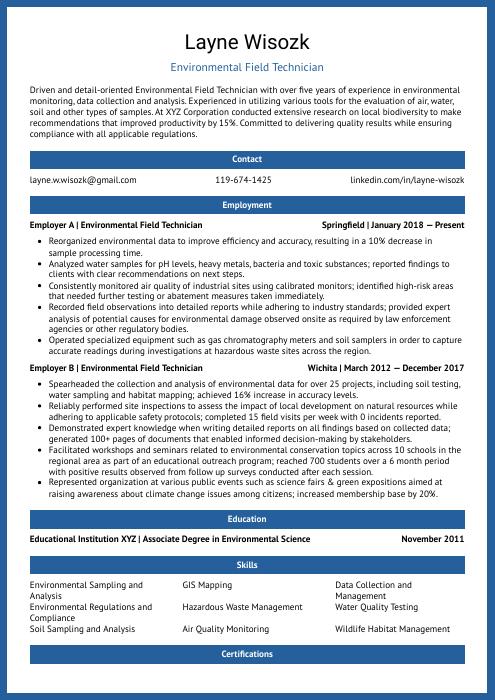 Ocelot
Ocelot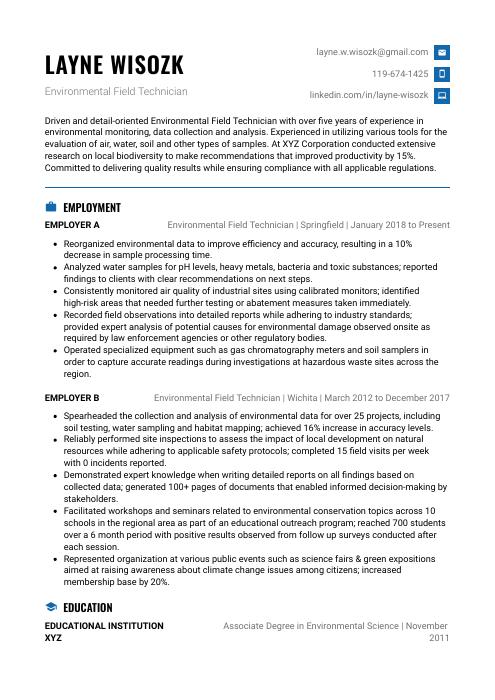 Echidna
Echidna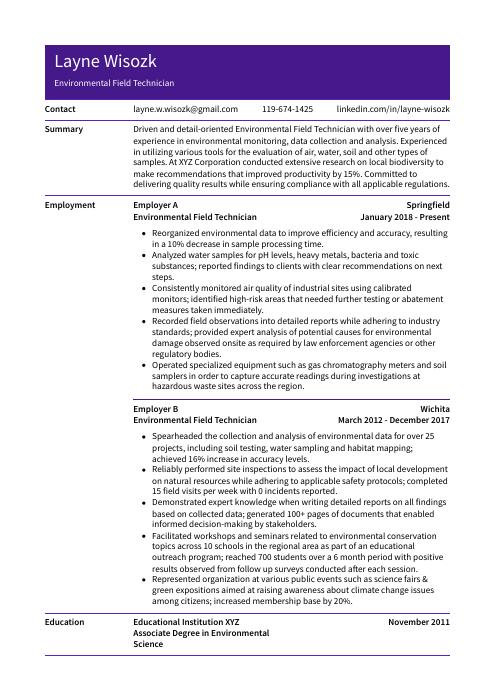 Pika
Pika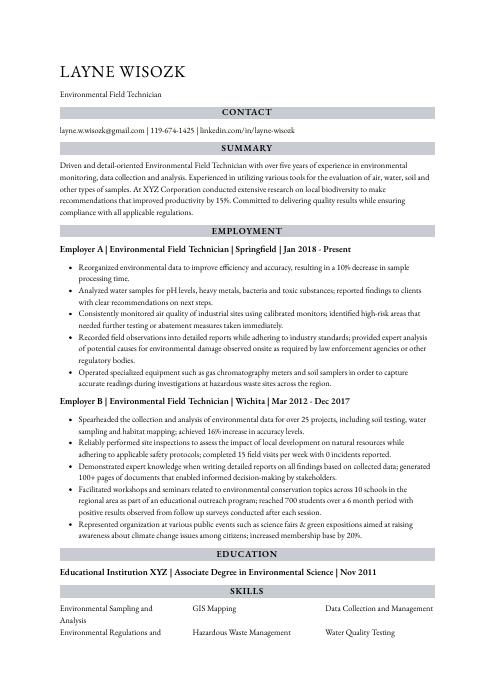 Numbat
Numbat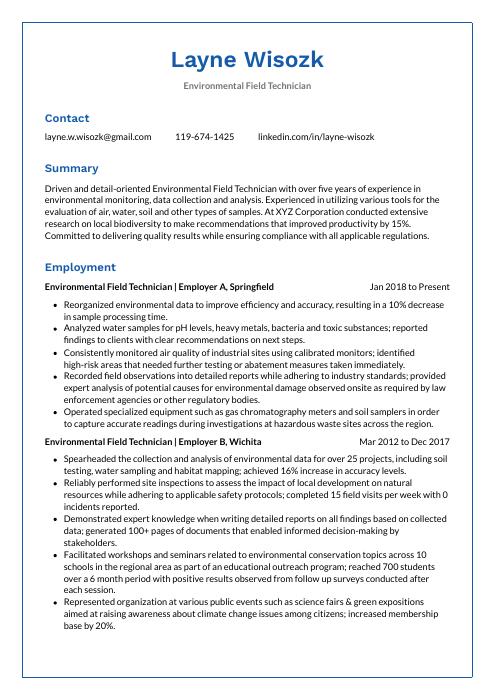 Markhor
Markhor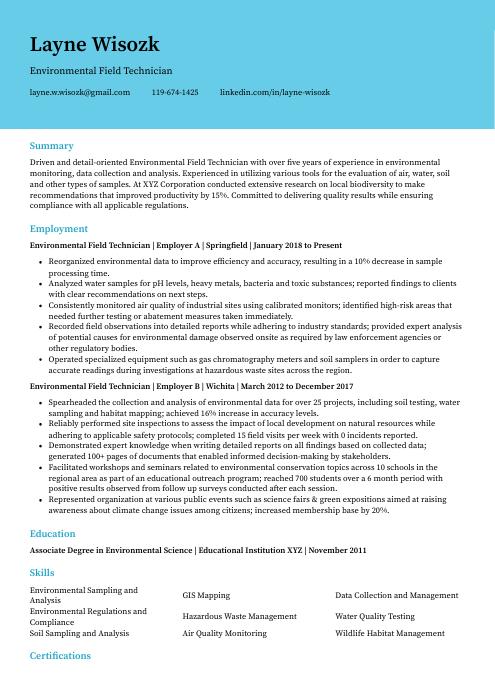 Dugong
Dugong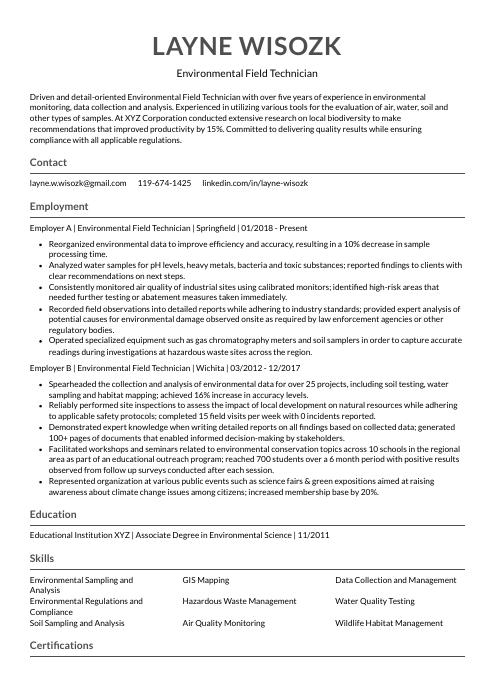 Indri
Indri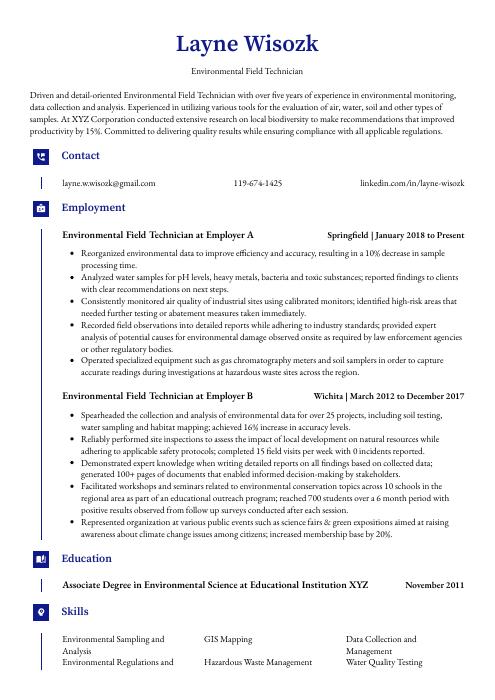 Gharial
Gharial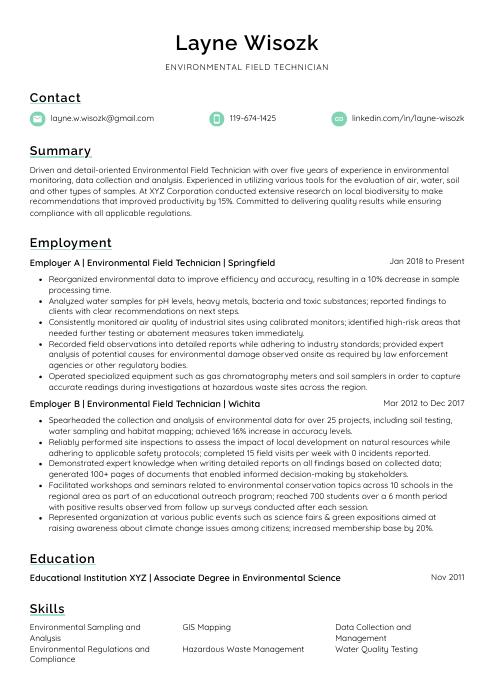 Lorikeet
Lorikeet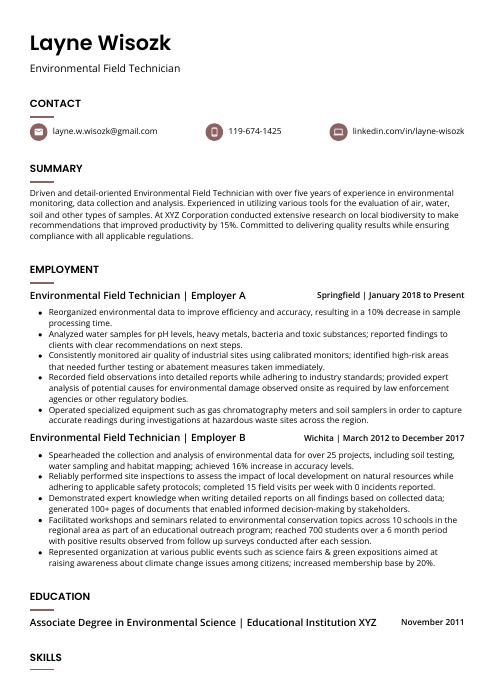 Fossa
Fossa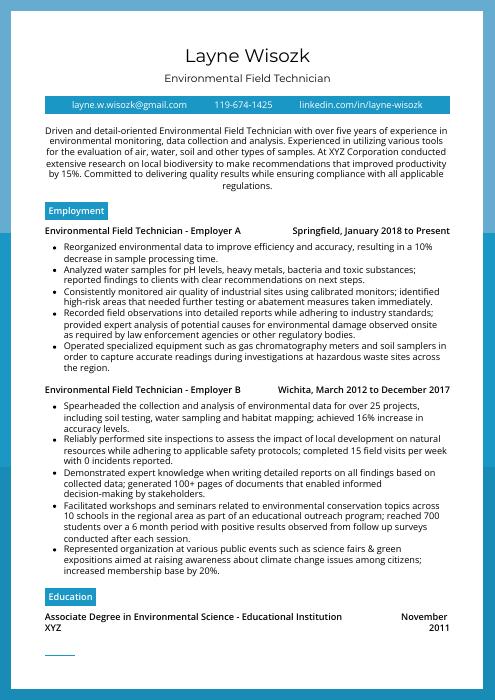 Rhea
Rhea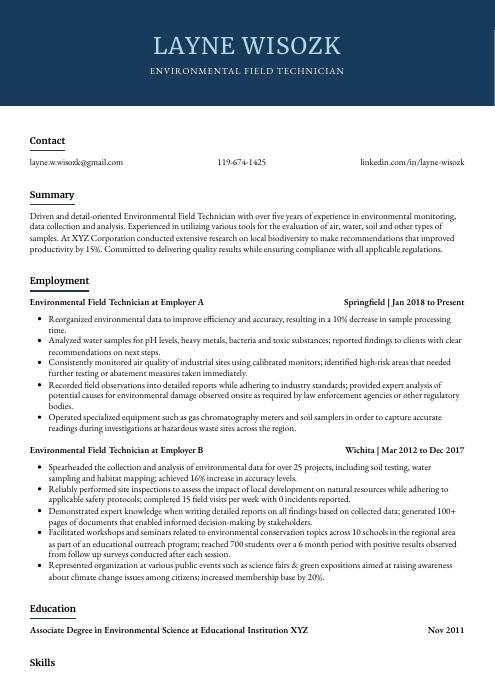 Bonobo
Bonobo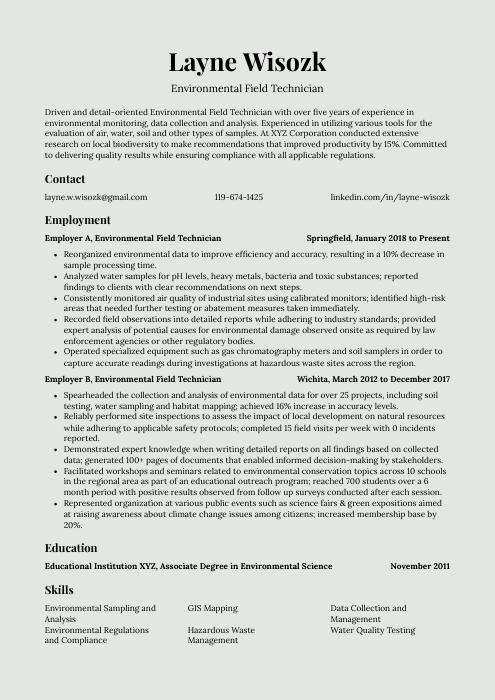 Saola
Saola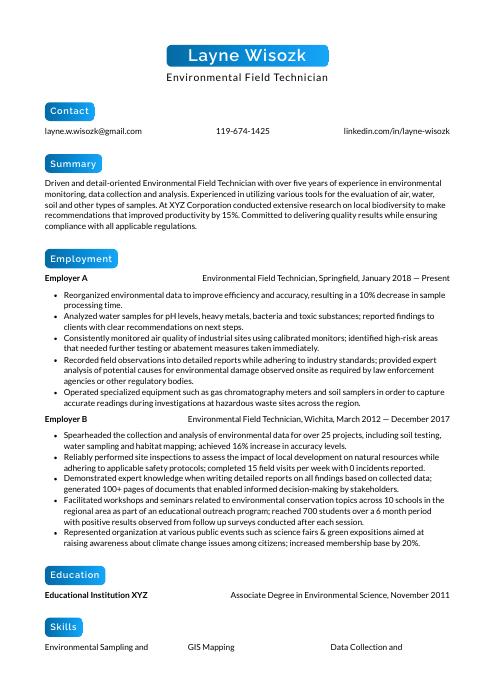 Kinkajou
Kinkajou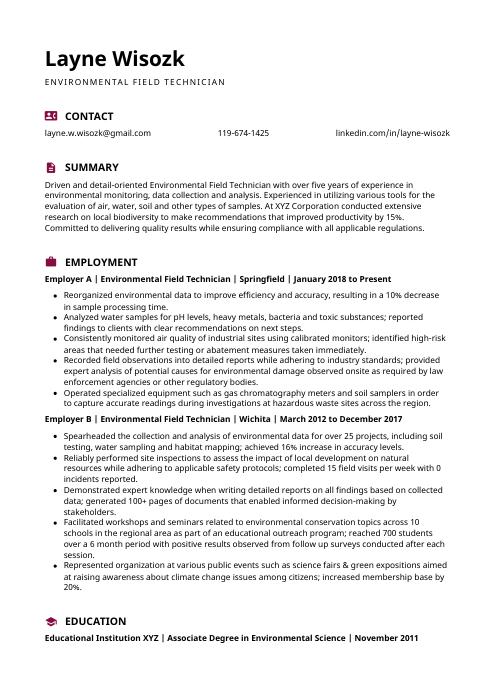 Hoopoe
Hoopoe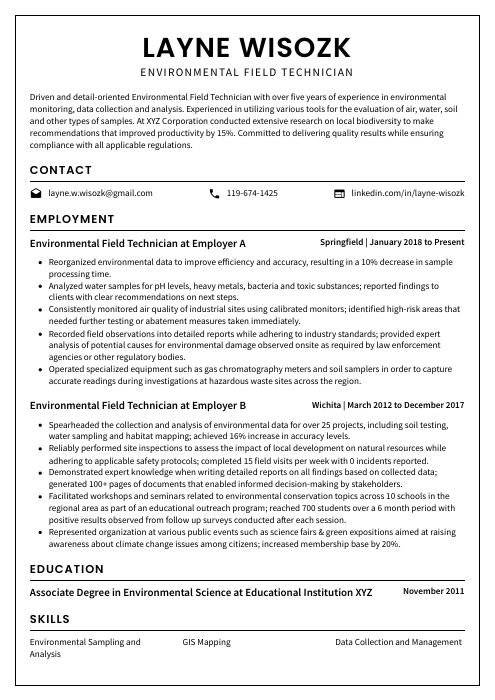 Cormorant
Cormorant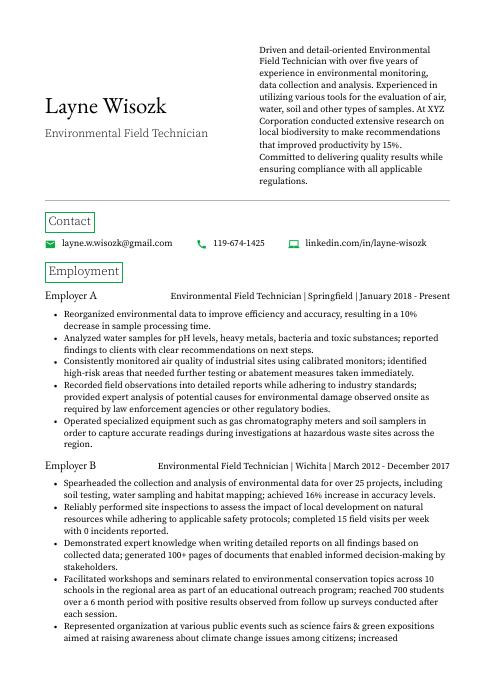 Quokka
Quokka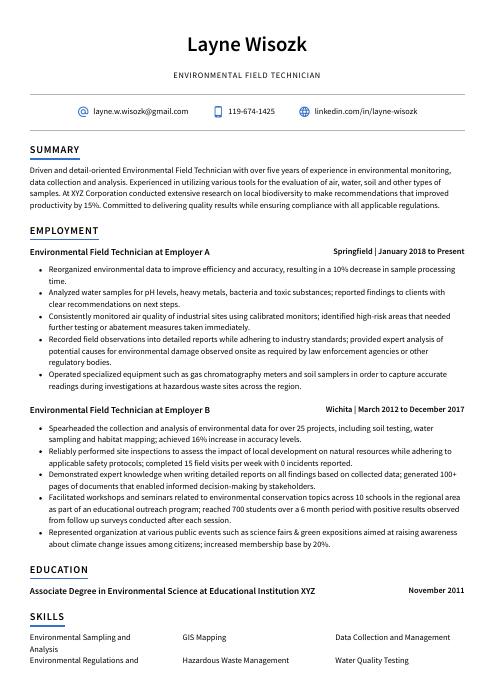 Axolotl
Axolotl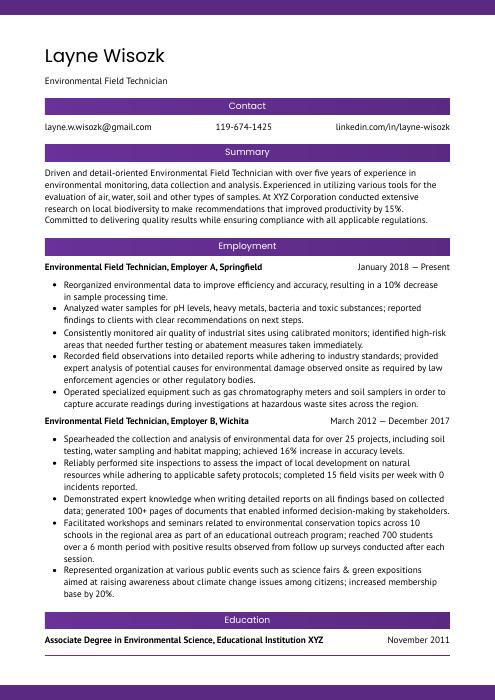 Jerboa
Jerboa Rezjumei
Rezjumei
